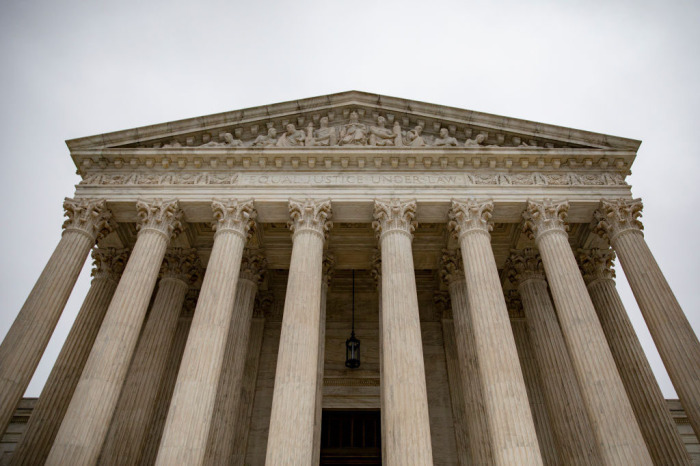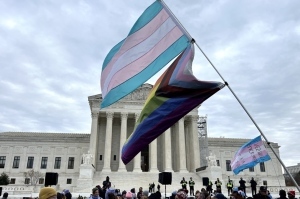Biden commission divided on expanding Supreme Court, warns of ‘considerable’ risks

A commission created by President Joe Biden to consider adding seats to the U.S. Supreme Court has released draft discussion materials that seemingly express concerns that the idea comes with "risks" and could be perceived as "a partisan maneuver."
According to the discussion materials released Thursday ahead of a Friday meeting, the 36-member commission is divided on whether it is a good idea to add seats to the nine-justice Supreme Court, the highest court in the United States.
The documents warn that expanding the court "is likely to undermine, rather than enhance, the Supreme Court's legitimacy and its role in the constitutional system." The materials state that "there are significant reasons to be skeptical that expansion would serve democratic values."
The document notes that an expanded court might "calm the controversy" around Supreme Court nominees and allow for a more diverse representation on the bench than currently exists.
"But the risks of court expansion are considerable, including that it could undermine the very goal of some of its proponents of restoring the Court's legitimacy," the draft cautions.
Stated risks include ongoing partisan battles over future potential expansions, no guarantees of increased diversity for the court and more justices making it more difficult to reach decisions.
During his time in office, President Donald Trump nominated three justices to the Supreme Court, prompting what many believe to be a rightward shift in the court's political leanings.
Democrats were upset when the Republican-controlled Senate refused to vote on President Barack Obama's nomination of Merrick Garland to replace the late Justice Antonin Scalia after his death in 2016, Obama's last year in office.
Liberals also felt that the nomination to replace the late Justice Ruth Bader Ginsburg after her death last September should have waited so whoever won the presidential election in November could make the nomination. But Trump nominated Justice Amy Coney Barrett, who was confirmed to the court last October.
In April, Biden signed an executive order creating a presidential commission to look into the possibility of adding more seats to the U.S. Supreme Court and other measures.
"Proponents of Court expansion argue that by adding two or more seats to the Supreme Court, Democratic lawmakers could help restore balance to – and, thus, the legitimacy of – the Court," the draft document reads. "Those who take this perspective also emphasize that a failure to respond to the hardball tactics since 2016 might encourage future aggressive measures in the Senate confirmation process."
The draft materials also state that "[r]ecent polls suggest that a majority of the public does not support Court expansion."
"And even some supporters of Court expansion acknowledged during the Commission's public hearings, the reform… would be perceived by many as a partisan maneuver," the draft states.
Some progressives criticized the draft materials.
"The discussion materials released today unfortunately fail to match the urgency of the situation and do not lay out a solution to the legitimacy crisis before us," American Constitution Society President Russ Feingold said in a statement.
"There are a variety of reforms that should be advanced, including changing the composition of the Court to remedy the Right's packing of the Court, ending life tenure, and ensuring the Court cannot use the shadow docket as an express way to thwart civil rights and liberties."
Bob Bauer, the co-chair of the commission and a former White House Counsel to President Obama, stated at the Friday commission meeting that the draft materials are not to be construed as views of the commission.
"The commission has not edited the material and the material should not be understood to represent the commission's views or those of any particular commissioner," Bauer said, according to Fox News. "To this point and particularly in light of some confusion and uncertainty since the posting of these materials, we refer you to the front page of each of the drafts that have been publicly posted that clearly set forth these points."
Kelly Shackelford, CEO of the conservative religious freedom legal nonprofit First Liberty Institute, argued in a statement that "far-Left progressives are clearly trying to expand their political power under the guise of 'court-reform,' destroying the independence of our judiciary and threatening the civil liberties of all Americans."
"Americans reject remaking the judiciary — especially the Supreme Court of the United States — into another partisan body," Shackelford said in a statement.
After Biden signed his executive order to create the commission earlier this year, Democrats in Congress introduced legislation aimed at adding four seats to the Supreme Court. If passed, it would mark the first time seats have been added to the high court since the Antebellum Era.
U.S. Sen. Edward J. Markey of Massachusetts said in a statement in April that the legislation was in response to the Trump nominees being added to the Supreme Court.
"Senate Republicans have politicized the Supreme Court, undermined its legitimacy, and threatened the rights of millions of Americans, especially people of color, women, and our immigrant communities," claimed Markey.
"This legislation will restore the Court's balance and public standing and begin to repair the damage done to our judiciary and democracy, and we should abolish the filibuster to ensure we can pass it."
The proposal to add seats to the Supreme Court has been criticized by conservative groups and Republicans in Congress as a politically-driven move.
"Expanding the Supreme Court is a terrible idea. I strongly oppose this proposal and will vote against it should it come up for a vote," tweeted Sen. Lindsey Graham, R-S.C.





























